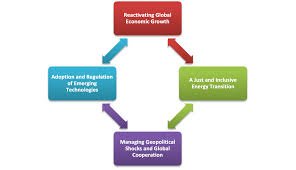Diplomacy has long served as humanity’s most effective tool for resolving disputes and fostering cooperation on a global scale. While conflicts are often born of deep divisions, diplomacy provides a pathway to reconciliation, dialogue, and lasting peace without resorting to violence. Whether it is mitigating tensions between nations, addressing internal political struggles, or crafting agreements on pressing global issues like climate change, the art and practice of diplomacy remain essential in shaping a stable and prosperous world.
This blog explores the role of diplomacy in resolving global conflicts, highlights case studies of successful diplomatic interventions, and provides insights into how diplomacy is evolving to meet the challenges of the 21st century.
The Essence of Diplomacy
Diplomacy is fundamentally about communication. It represents the method by which individuals, organizations, and governments negotiate their differing interests, seeking compromise while upholding the principles of mutual respect and cooperation. At its core, diplomacy is about finding common ground, even in the face of profound disagreements.
Key Principles of Diplomacy:
- Patience and Persistence – Diplomatic efforts often require time to build trust and overcome obstacles. It is seldom a quick process but one that necessitates dedication and determination.
- Neutrality – A good diplomat acts as a mediator, aiming to bridge divides without taking sides.
- Cultural Sensitivity – Diplomacy involves understanding and respecting the traditions, norms, and concerns of all parties involved.
While diplomacy has traditionally focused on state-to-state relations, its scope has broadened in recent years to include non-state actors, international organizations, and civil society. Modern diplomacy addresses everything from trade agreements and security issues to human rights and global health.
Diplomacy in Addressing Global Conflicts
Conflicts arise when competing interests, historical grievances, or ideological differences create friction between groups or nations. Left unchecked, such disputes can escalate into armed conflict, disrupting lives, economies, and regional stability. Diplomacy, however, offers tools for transforming these challenges into opportunities for collaboration.
How Diplomacy Works in Conflict Resolution
- Facilitating Dialogue
When tensions run high, communication often breaks down. Diplomacy creates a platform for dialogue, allowing conflicting parties to present their concerns and explore solutions together. Mediators play a critical role by ensuring that discussions remain constructive.
- Building Trust
Distrust is one of the greatest barriers to peace. Diplomacy seeks to foster trust through confidence-building measures, such as ceasefires or preliminary agreements, which pave the way for more substantive negotiations.
- Negotiating Agreements
Diplomats work to craft agreements that accommodate the interests of all parties. These compromises often require creative problem-solving and a willingness to make concessions on all sides.
- Preventing Escalation
Diplomatic efforts are often aimed at de-escalating tensions before they spiral into open conflict. By addressing disputes early and decisively, diplomacy can prevent violence and avert humanitarian crises.
- Rebuilding Relationships
Once an agreement is reached, diplomacy continues to play a role in monitoring compliance and supporting post-conflict recovery efforts. This long-term engagement is essential to ensuring that peace is maintained.
Case Studies in Diplomatic Success
Several landmark examples demonstrate how diplomacy has effectively resolved conflicts and contributed to international stability.
1. The Camp David Accords (1978)
The Camp David Accords, brokered by U.S. President Jimmy Carter, were a historic peace agreement between Egypt and Israel. After decades of hostility, the accords established diplomatic relations between the two nations and addressed key points of contention, such as territorial disputes.
Why It Worked:
- Both parties had a mutual interest in achieving peace.
- The negotiation process was facilitated by a neutral third-party mediator.
- The accords offered tangible benefits, such as Israel’s withdrawal from the Sinai Peninsula in return for Egypt’s recognition of Israel.
2. The Good Friday Agreement (1998)
This agreement marked a turning point in the decades-long conflict in Northern Ireland, known as “The Troubles.” Signed by the British and Irish governments as well as the main political parties in Northern Ireland, the agreement addressed constitutional, political, and social issues.
Keys to Success:
- The process was inclusive, involving both local and international stakeholders.
- Confidence-building measures, such as decommissioning weapons, were implemented.
- Public support played a crucial role, with referenda held in both Ireland and Northern Ireland to ratify the agreement.
3. The Paris Climate Agreement (2015)
While not a conflict in the traditional sense, climate change represents one of the most significant global challenges of our time. The Paris Agreement brought together 196 countries to commit to reducing greenhouse gas emissions and limiting global temperature rise.
Diplomatic Achievements:
- The agreement allowed for flexibility, enabling nations to set their own targets based on their capacities.
- Transparency mechanisms were introduced to monitor progress.
- The agreement emphasized collective action, fostering a sense of shared responsibility.
Modern Challenges to Diplomacy
While diplomacy has made remarkable strides in resolving conflicts, it is not without its challenges. Global politics, evolving technologies, and emerging power dynamics continue to reshape the landscape of international relations.
1. Polarization and Distrust
The rise of populism and nationalist rhetoric in many countries has created environments where compromise is often viewed as a weakness. This polarization complicates diplomatic efforts.
2. Non-State Actors
Traditional diplomacy often focuses on negotiations between nation-states. However, the increasing influence of non-state actors, such as terrorist organizations, multinational corporations, and advocacy groups, presents new complexities.
3. Cybersecurity Threats
The digital age has introduced a new realm of conflict – cyberspace. Addressing issues such as cyberattacks, disinformation campaigns, and data breaches requires innovative diplomatic approaches.
4. Climate-Induced Disputes
As climate change exacerbates resource scarcity and triggers migration, new conflicts are likely to arise. Diplomatic strategies must adapt to these evolving challenges to ensure sustainable solutions.
The Future of Diplomacy
Diplomacy is evolving to address the complexities of a highly interconnected world.
1. Digital Diplomacy
The rise of digital technologies has transformed how diplomats communicate and collaborate. Tools such as social media, virtual meetings, and data analytics are now integral to diplomatic efforts.
2. Inclusive Diplomacy
Recognizing the diverse actors involved in global governance, modern diplomacy increasingly includes voices from civil society, indigenous communities, and the private sector.
3. Preventive Diplomacy
Rather than responding to conflicts after they erupt, preventive diplomacy focuses on addressing underlying causes and tensions early on. This proactive approach requires continuous monitoring and swift action.
4. Climate Diplomacy
With environmental challenges posing existential threats, climate diplomacy is becoming a central pillar of international relations. Collaborative efforts to address issues such as carbon emissions, deforestation, and ocean conservation are critical to securing a sustainable future.
Key Takeaways for Advancing Diplomacy
For diplomacy to remain effective in resolving global conflicts, several core principles must be upheld:
- Commitment to Multilateralism – Nations must prioritize cooperative solutions over unilateral actions.
- Investment in Training and Education – Future diplomats need a deep understanding of cultural dynamics, communication techniques, and emerging global issues.
- Flexibility and Adaptability – Diplomats must be equipped to address challenges beyond traditional geopolitical concerns, including cybersecurity and sustainability.
Final Thoughts
Diplomacy stands as a testament to the power of dialogue and cooperation in creating a more harmonious world. While conflicts and disagreements are inevitable, diplomacy offers a path toward understanding, compromise, and progress. For individuals, governments, and organizations alike, investing in the art of diplomacy is an investment in lasting peace and stability.
By adapting to modern challenges and fostering a spirit of collaboration, diplomacy will continue to play a vital role in resolving conflicts and crafting a brighter future for all.


